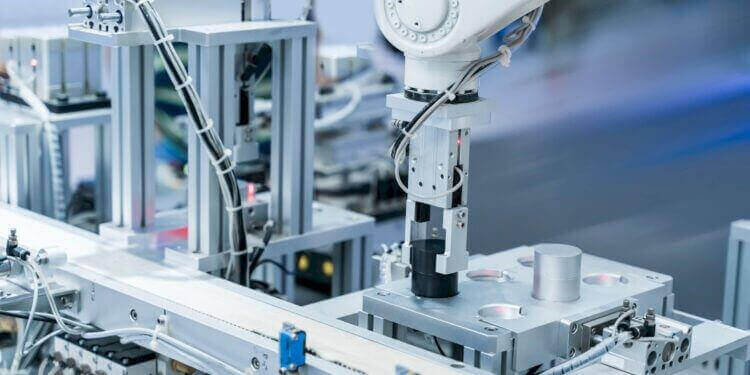A smart factory is a highly digitized and connected production facility that relies on advanced manufacturing technologies to increase efficiency and productivity. In other words, it’s a factory that uses cutting-edge technology to get the job done better and faster. It’s essential for the strategies of smart manufacturing in the United States.
When done right, it can deal with the ongoing manufacturing problems in the country. It can also lead to less reliance on China to produce cheap products. So, what exactly are the essentials of a smart factory? Let’s take a look.
Advanced Manufacturing Technologies
One of the essentials of a smart factory is advanced manufacturing technologies. Two leading technologies are helping smart factories. 3D printing and robots:
3D Printing
Chuck Hull invented 3D printing in 1984. It allows for the creation of objects by laying down successive layers of material. In a smart factory, 3D printing can increase customization and reduce waste and lead time. Additionally, you can use it in the medical field to create prosthetics, dental implants, and even human tissue. So factories can use it even in less intensive manufacturing processes.
Robotics
Robots are one of the essential advanced manufacturing technologies in a smart factory. They can perform tasks with precision and accuracy, working continuously without breaks or fatigue. This can help increase productivity and efficiency in the factory. Additionally, robots can assist humans in performing dangerous tasks, improving safety for workers.
Various technologies are working with robotics. One of them is the reliable Cobot technology. This technology allows robots to work safely and collaboratively with human workers. They can even help train employees to perform their tasks better.
Using advanced manufacturing technologies, factories can produce goods more quickly and efficiently than ever.
online pharmacy purchase albuterol online best drugstore for you
They can also customize products to meet the specific needs of their customers.
online pharmacy purchase trazodone online best drugstore for you

Connectedness and Data Analytics
Another essential of a smart factory is connectedness. Smart factories are connected to the internet and other machines and devices within the factory itself. This interconnectedness allows for real-time data collection and analysis. This data can then be used to improve production processes and make better decisions, from inventory management to marketing strategies. Two technologies are responsible for connectedness and data analytics in smart factories:
IoT
The internet of things is a network of devices and objects that can collect and exchange data. In a smart factory, these devices can track production processes and gather information on energy usage and machine performance. This technology allows for better decision-making in the factory based on real-time data analysis.
Big Data Analytics
Big data analytics is the process of analyzing large sets of data to uncover patterns and trends. In a smart factory, factories can use it to optimize production processes, improve product quality, and predict machine maintenance needs. It also helps supply chain management by identifying potential challenges and finding solutions.
A smart factory’s connectedness and data analytics allow for better decision-making and increased efficiency in production processes.
Enhanced security features
The increased connectivity of smart factories also necessitates enhanced security features. After all, if your factory is connected to the internet, it’s vulnerable to cyberattacks. Therefore, smart factories use various security features to prevent cyber-attacks. Here are some standard cybersecurity options for smart factories:
Firewalls
Firewalls are a barrier between the factory’s network and the internet, blocking unauthorized access. They can also monitor and control data flow to and from the network.
Encryption
Encryption scrambles data to prevent unauthorized access. It is often used for sensitive information such as financial transactions or personal information.
Identity and Access Management
This technology allows for controlling and monitoring access to the factory’s network. For example, it can track which employees can access certain areas or information and ensure that only authorized individuals can access them.
Network Penetration Testing
This involves simulating a cyber-attack to identify vulnerabilities in the factory’s network. It allows for addressing and fixing potential security issues before hackers can exploit them.
Using these security measures helps ensure that a smart factory’s connectedness does not leave it vulnerable to cyber threats.
Trained Employees
Although smart factories have fewer employees than traditional factories due to automation, those who work in them must have the necessary skills and training. Smart factory employees need technical knowledge, problem-solving abilities, and communication skills. In addition, they must be able to operate and troubleshoot complex machinery, work with others, and make decisions based on data analysis.
online pharmacy purchase bactroban online best drugstore for you
Investing in employee training and education helps ensure that a smart factory can fully utilize its technology and reach its potential for increased efficiency and productivity.
Overall, smart factories use various technologies to improve production processes, enhance security, and train their employees. These advancements bring significant benefits for businesses, such as increased efficiency, customer customization options, and better decision-making capabilities. As more industries adopt these technologies, the economy can also see a boost in productivity and competitiveness.
Read More: Smart Technologies: How Blockchain and AI are a Perfect Match


